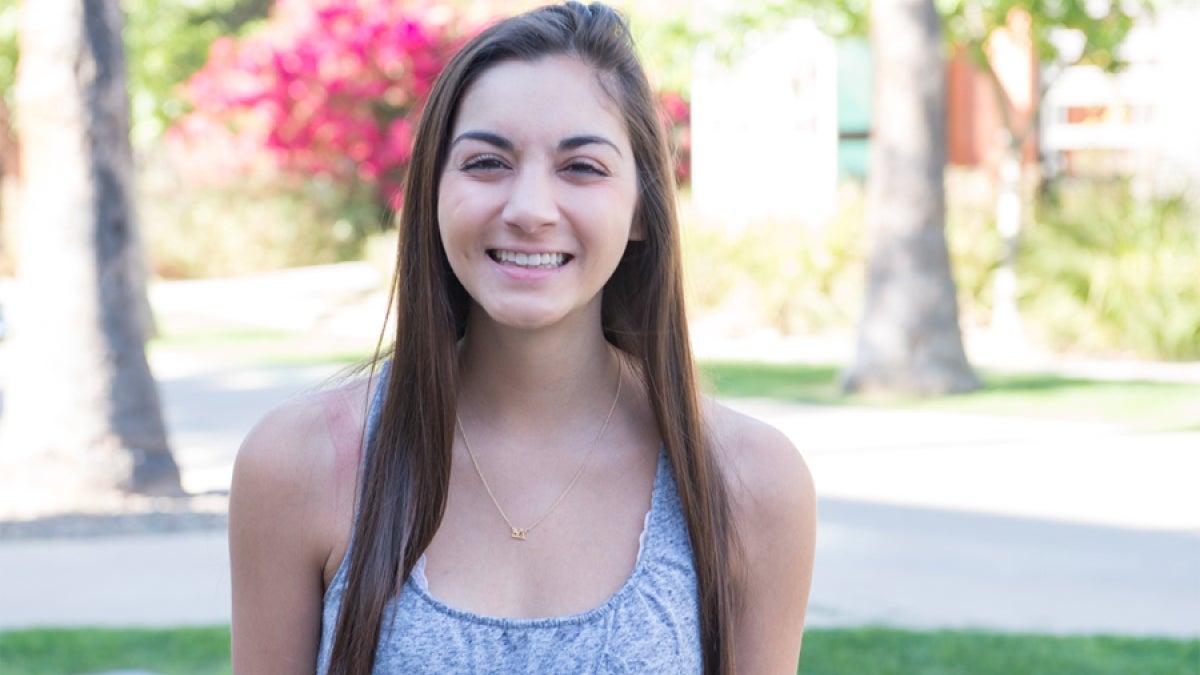Editor’s note: This is part of a series of profiles for spring 2017 commencement. See more graduates here.
School of Molecular Sciences senior Capria Rinaldi, who hails from the picturesque town of Coeur d' Alene, Idaho, excels in research.
Professor Joshua LaBaer, Virginia G. Piper Chair for Personalized Medicine in the School of Molecular Sciences and the executive director of ASU’s Biodesign Institute, has both taught Rinaldi and has supervised her independent research. LaBaer describes these experiences as a pleasure and an honor and says that Rinaldi is one of the brightest students he has ever interacted with.
“She gave presentations in class based on primary research articles that are as good as many post-doctoral fellows I have seen,” said LaBaer, and “In the lab, she is talented with her experimental skills, hardworking and always does more than she is asked to. My team and I are so proud of her and know that she will continue to do great things!”
Rinaldi, the recipient of the School of Molecular Sciences 2017 Distinguished Biochemistry Merit Award that is given to the best biochemistry graduating senior, answered some questions about her experiences at ASU.
Question: What was your “aha” moment, when you realized you wanted to study the field you majored in?
Answer: I realized I wanted to study medicinal biochemistry after doing my high school senior project on pharmacogenomics/personalized medicine. I chose biochemistry as a major that could lead me to pursue pharmaceutical sciences in my research and after college.
Q: What’s something you learned while at ASU — in the classroom or otherwise — that surprised you, that changed your perspective?
A: During my time at ASU, I learned how much is still unknown about the human body (the brain in particular). I had thought that at this point in time, we would be able to explain the causes and treatments for neurological disorders such as depression and Alzheimer's disease. I was surprised by the lack of understanding in this field, and that is a large reason why I want to pursue neuropharmacology in graduate school.
Q: Why did you choose ASU?
A: I chose ASU for financial reasons and because I wanted a change of scenery from my hometown. ASU made the most sense to me, and I am extremely happy that I made the choice to study here.
Q: What’s the best piece of advice you’d give to those still in school?
A: I would tell those still in school to focus on the bigger picture and find motivation in the long-term goals you want to achieve. It is easy to get overwhelmed or frustrated by the day-to-day homework assignments and exams in college, but you should remember why you are doing it.
Q: What was your favorite spot on campus, whether for studying, meeting friends or just thinking about life?
A: My favorite place on campus is the lawn in front of Old Main. There are a lot of shady areas where you can sit and do homework or just relax and people-watch. I like looking around the university and recognizing the vast diversity of the student body, because that is something I was not exposed to before college.
Q: What are your plans after graduation?
A: I will be doing a summer research internship in the Translational Oncology department at Genentech. Then, I will be starting a PhD program in Pharmaceutical Sciences and Pharmacogenomics at the University of California, San Francisco.
Q: If someone gave you $40 million to solve one problem on our planet, what would you tackle?
A: I would use the money to create programs to support homeless or incarcerated individuals suffering from mental illness such as schizophrenia or bipolar disorder. People suffering from these illnesses often end up without a home or in prison as a result of their disorders, and these resulting situations can often perpetuate the illness. If there were resources available to help these individuals, there would be a chance for them to get the counseling and medication they need to become functioning members of society once again.
More Health and medicine

The science of sibling dynamics: Why we fight, how we relate and why it matters
We have Mother’s Day, Father’s Day and even Grandparents’ Day. But siblings? Usually they get a hand-me-down sweatshirt and, with any luck, a lifetime of inside jokes.But actually, there is a…

New study seeks to combat national kidney shortage, improve availability for organ transplants
Chronic kidney disease affects one in seven adults in the United States. For two in 1,000 Americans, this disease will advance to kidney failure.End-stage renal failure has two primary…

New initiative aims to make nursing degrees more accessible
Isabella Koklys is graduating in December, so she won’t be one of the students using the Edson College of Nursing and Health Innovation's mobile simulation unit that was launched Wednesday at Arizona…


